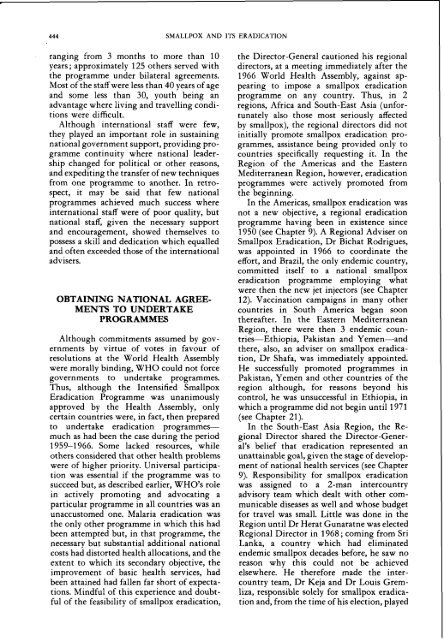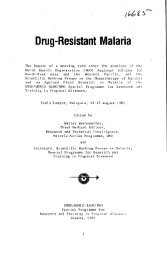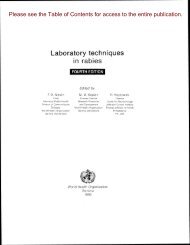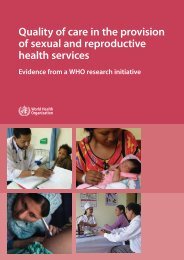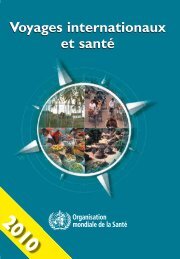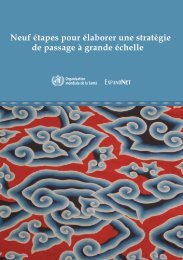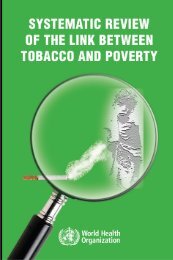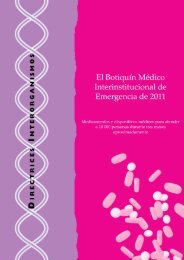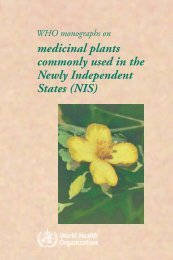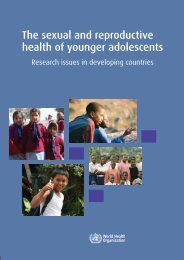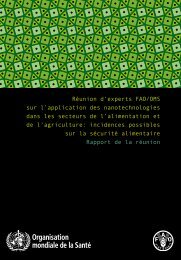smallpox eradication - libdoc.who.int - World Health Organization
smallpox eradication - libdoc.who.int - World Health Organization
smallpox eradication - libdoc.who.int - World Health Organization
You also want an ePaper? Increase the reach of your titles
YUMPU automatically turns print PDFs into web optimized ePapers that Google loves.
444 SMALLPOX AND ITS ERADICATION<br />
ranging from 3 months to more than 10<br />
years; approximately 125 others served with<br />
the programme under bilateral agreements.<br />
Most of the staff were less than 40 years of age<br />
and some less than 30, youth being an<br />
advantage where living and travelling conditions<br />
were difficult.<br />
Although <strong>int</strong>ernational staff were few,<br />
they played an important role in sustaining<br />
national government support, providing programme<br />
continuity where national leadership<br />
changed for political or other reasons,<br />
and expediting the transfer of new techniques<br />
from one programme to another. In retrospect,<br />
it may be said that few national<br />
programmes achieved much success where<br />
<strong>int</strong>ernational staff were of poor quality, but<br />
national staff, given the necessary support<br />
and encouragement, showed themselves to<br />
possess a skill and dedication which equalled<br />
and often exceeded those of the <strong>int</strong>ernational<br />
advisers.<br />
OBTAINING NATIONAL AGREE-<br />
MENTS TO UNDERTAKE<br />
PROGRAMMES<br />
Although commitments assumed by governments<br />
by virtue of votes in favour of<br />
resolutions at the <strong>World</strong> <strong>Health</strong> Assembly<br />
were morally binding, WHO could not force<br />
governments to undertake programmes.<br />
Thus, although the Intensified Smallpox<br />
Eradication Programme was unanimously<br />
approved by the <strong>Health</strong> Assembly, only<br />
certain countries were, in fact, then prepared<br />
to undertake <strong>eradication</strong> programmesmuch<br />
as had been the case during the period<br />
1959-1 966. Some lacked resources, while<br />
others considered that other health ~roblems<br />
were of higher priority. Universal participation<br />
was essential if the programme was to<br />
succeed but, as described earlier, WHO'S role<br />
in actively promoting and advocating a<br />
particular programme in all countries was an<br />
unaccustomed one. Malaria <strong>eradication</strong> was<br />
the only other programme in which this had<br />
been attempted but, in that programme, the<br />
necessary but substantial additional national<br />
costs had distorted health allocations, and the<br />
extent to which its secondary objective, the<br />
improvement of basic health services, had<br />
been attained had fallen far short of expectations.<br />
Mindful of this experience and doubtful<br />
of the feasibility of <strong>smallpox</strong> <strong>eradication</strong>,<br />
the Director-General cautioned his regional<br />
directors, at a meeting immediately after the<br />
1966 <strong>World</strong> <strong>Health</strong> Assembly, against appearing<br />
to impose a <strong>smallpox</strong> <strong>eradication</strong><br />
programme on any country. Thus, in 2<br />
regions, Africa and South-East Asia (unfortunately<br />
also those most seriously affected<br />
by <strong>smallpox</strong>), the regional directors did not<br />
initially promote <strong>smallpox</strong> <strong>eradication</strong> programmes,<br />
assistance being provided only to<br />
countries specifically requesting it. In the<br />
Region of the Americas and the Eastern<br />
Mediterranean Region, however, <strong>eradication</strong><br />
programmes were actively promoted from<br />
the beginning.<br />
In the Americas, <strong>smallpox</strong> <strong>eradication</strong> was<br />
not a new objective, a regional <strong>eradication</strong><br />
programme having been in existence since<br />
1950 (see Chapter 9). A Regional Adviser on<br />
Smallpox Eradication, Dr Bichat Rodrigues,<br />
was appo<strong>int</strong>ed in 1966 to coordinate the<br />
effort, and Brazil, the only endemic country,<br />
committed itself to a .national <strong>smallpox</strong><br />
<strong>eradication</strong> programme employing what<br />
were then the new jet injectors (see Chapter<br />
12). Vaccination campaigns in many other<br />
countries in South America began soon<br />
thereafter. In the Eastern Mediterranean<br />
Region, there were then 3 endemic countries-Ethiopia,<br />
Pakistan and Yemen-and<br />
1 .<br />
there, also, an adviser on <strong>smallpox</strong> eradica-<br />
tion, Dr Shafa, was immediately . appo<strong>int</strong>ed. --<br />
He successfully promoted programmes in<br />
Pakistan, Yemen and other countries of the<br />
region although, for reasons beyond his<br />
control, he was unsuccessful in Ethiopia, in<br />
which a programme did not begin until 1971<br />
(see Chapter 21).<br />
In the South-East Asia Region, the Regional<br />
Director shared the Director-General's<br />
belief that <strong>eradication</strong> represented an<br />
unattainable goal, given the stage of development<br />
of national health services (see Chapter<br />
9). Responsibility for <strong>smallpox</strong> <strong>eradication</strong><br />
was assigned to a 2-man <strong>int</strong>ercountry<br />
advisory team which dealt with other communicable<br />
diseases as well and <strong>who</strong>se budget<br />
for travel was small. Little was done in the<br />
Region until Dr Herat Gunaratne was elected<br />
Regional Director in 1968 ; coming from Sri<br />
Lanka, a country which had eliminated<br />
endemic smallvox~decades before. he saw no<br />
reason why ;his could not be achieved<br />
elsewhere. He therefore made the <strong>int</strong>ercountry<br />
team, Dr Keja and Dr Louis Gremliza,<br />
responsible solely for <strong>smallpox</strong> <strong>eradication</strong><br />
and, from the time of his election, played


